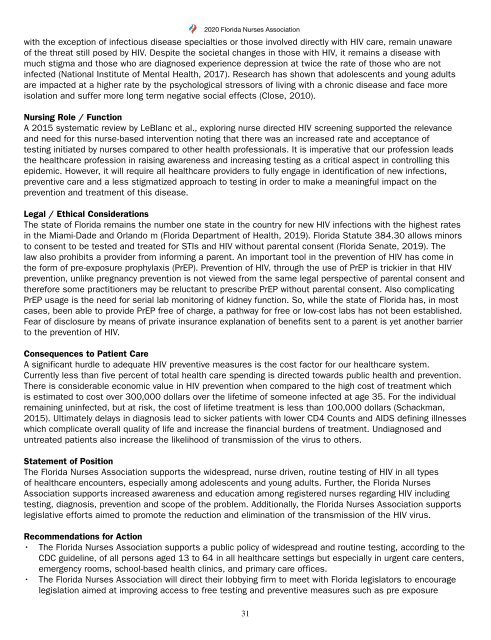2020 FNA Book Of Reports
You also want an ePaper? Increase the reach of your titles
YUMPU automatically turns print PDFs into web optimized ePapers that Google loves.
<strong>2020</strong> Florida Nurses Association<br />
with the exception of infectious disease specialties or those involved directly with HIV care, remain unaware<br />
of the threat still posed by HIV. Despite the societal changes in those with HIV, it remains a disease with<br />
much stigma and those who are diagnosed experience depression at twice the rate of those who are not<br />
infected (National Institute of Mental Health, 2017). Research has shown that adolescents and young adults<br />
are impacted at a higher rate by the psychological stressors of living with a chronic disease and face more<br />
isolation and suffer more long term negative social effects (Close, 2010).<br />
Nursing Role / Function<br />
A 2015 systematic review by LeBlanc et al., exploring nurse directed HIV screening supported the relevance<br />
and need for this nurse-based intervention noting that there was an increased rate and acceptance of<br />
testing initiated by nurses compared to other health professionals. It is imperative that our profession leads<br />
the healthcare profession in raising awareness and increasing testing as a critical aspect in controlling this<br />
epidemic. However, it will require all healthcare providers to fully engage in identification of new infections,<br />
preventive care and a less stigmatized approach to testing in order to make a meaningful impact on the<br />
prevention and treatment of this disease.<br />
Legal / Ethical Considerations<br />
The state of Florida remains the number one state in the country for new HIV infections with the highest rates<br />
in the Miami-Dade and Orlando m (Florida Department of Health, 2019). Florida Statute 384.30 allows minors<br />
to consent to be tested and treated for STIs and HIV without parental consent (Florida Senate, 2019). The<br />
law also prohibits a provider from informing a parent. An important tool in the prevention of HIV has come in<br />
the form of pre-exposure prophylaxis (PrEP). Prevention of HIV, through the use of PrEP is trickier in that HIV<br />
prevention, unlike pregnancy prevention is not viewed from the same legal perspective of parental consent and<br />
therefore some practitioners may be reluctant to prescribe PrEP without parental consent. Also complicating<br />
PrEP usage is the need for serial lab monitoring of kidney function. So, while the state of Florida has, in most<br />
cases, been able to provide PrEP free of charge, a pathway for free or low-cost labs has not been established.<br />
Fear of disclosure by means of private insurance explanation of benefits sent to a parent is yet another barrier<br />
to the prevention of HIV.<br />
Consequences to Patient Care<br />
A significant hurdle to adequate HIV preventive measures is the cost factor for our healthcare system.<br />
Currently less than five percent of total health care spending is directed towards public health and prevention.<br />
There is considerable economic value in HIV prevention when compared to the high cost of treatment which<br />
is estimated to cost over 300,000 dollars over the lifetime of someone infected at age 35. For the individual<br />
remaining uninfected, but at risk, the cost of lifetime treatment is less than 100,000 dollars (Schackman,<br />
2015). Ultimately delays in diagnosis lead to sicker patients with lower CD4 Counts and AIDS defining illnesses<br />
which complicate overall quality of life and increase the financial burdens of treatment. Undiagnosed and<br />
untreated patients also increase the likelihood of transmission of the virus to others.<br />
Statement of Position<br />
The Florida Nurses Association supports the widespread, nurse driven, routine testing of HIV in all types<br />
of healthcare encounters, especially among adolescents and young adults. Further, the Florida Nurses<br />
Association supports increased awareness and education among registered nurses regarding HIV including<br />
testing, diagnosis, prevention and scope of the problem. Additionally, the Florida Nurses Association supports<br />
legislative efforts aimed to promote the reduction and elimination of the transmission of the HIV virus.<br />
Recommendations for Action<br />
• The Florida Nurses Association supports a public policy of widespread and routine testing, according to the<br />
CDC guideline, of all persons aged 13 to 64 in all healthcare settings but especially in urgent care centers,<br />
emergency rooms, school-based health clinics, and primary care offices.<br />
• The Florida Nurses Association will direct their lobbying firm to meet with Florida legislators to encourage<br />
legislation aimed at improving access to free testing and preventive measures such as pre exposure<br />
31

















